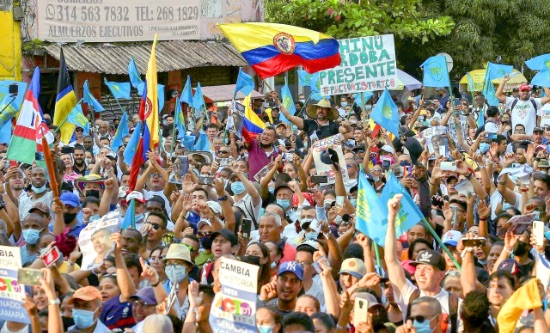
On 13 March 18 million Colombians voted in presidential primaries, selecting candidates for the 29 May presidential election. In a voter turnout of 46%, Gustavo Petro, a former guerrilla in the M-19 rebel group, secured the nomination of the centre-left-wing ‘Historic Pact’ coalition. He is predicted to replace current right-wing president Iván Duque. This is a turning point towards the rejection of a string of right-wing presidents who have for years openly and violently repressed the working classes. If Petro becomes president, US imperialism’s grip on the continent will face a sharp jolt. In a move to ensure the Colombian military’s loyalty, on 10 March US President Biden announced his intention to designate Colombia as a major extra-NATO ally.
A fractured Congress
Legislative elections were also held for 167 (of 172) members of the House of Representatives, 103 (of 108) Senators. They produced a rebuff for current President Duque’s right wing Democratic Centre party, the main political force in Colombia until now. Democratic Centre lost 10 of its coalition seats in Congress. It had selected Oscar Ivan Zuluaga as presidential candidate but after this loss, Zuluaga dropped out to support right wing Federico Gutiérrez’s ‘Team Colombia’ grouping. Gutiérrez and ‘centrist’ Sergio Fajardo of ‘Hope Centre’ coalition secured the respective nominations for the other big coalitions.
Petro won 4.49 million votes, 80.5% of the votes cast by Historic Pact supporters. In May he will need twice as many votes to win the presidency. In the Senate, Historic Pact gained 16 of the 108 seats, which are dominated by right wing and ‘centre right’ candidates. Petro will have no choice but to attempt alliances with the Green Alliance Coalition and others including the ‘Commons’ party and Peace representatives in both houses, but will face constant legislative obstruction.
Significantly, of the six candidates for the Historic Pact’s leadership, Francia Márquez, a black woman, obtained 15% of the votes, nationally the third most votes behind Petro and Gutiérrez. Her support is centred in the capital Bogota. Four million young Colombians have gained the right to vote since 2018, a boost of over 10% the voting lists. Petro promised that if he became President, Francia Márquez would be vice president, but his campaign spokespersons have suggested they would opt for someone else in order to ‘bring liberal sectors closer’, presenting a test for Petro’s political principles.
A violent campaign
The elections were preceded by a continuous period of killings of progressive social leaders, trade unionists, journalists exposing state protected crimes, and demilitarised FARC-EP members (306 since 2016); all together the highest number since 2011. The aim is to suffocate demands for the implementation of unfulfilled ‘Peace’ agreements on land and social reform. Colombia has the world’s highest murder rate for human rights defenders.
The elections followed large-scale riots in key cities from April 2021 against increased taxes, government corruption, and health care ‘reform’ proposals. The urban protesters were treated with the same murderous brutality applied to the rural population for years (see FRFI 283). From March 2021 to January 2022, the Colombian Electoral Observation Mission reported 455 violent acts against political, social, and communal leaders. The Ombudsman’s Office of Colombia had warned that 274 municipalities were at an ‘extreme or high risk’ of armed attacks ahead of the legislative and presidential elections, and 75% of voters feared an elite-orchestrated fraud skewing the result.
On 10 March the UN High Commissioner for Human Rights, Michelle Bachelet, was compelled to call on Duque to guarantee violence-free elections, stressing the importance of the Truth Commission, the Special Jurisdiction for Peace and the Unit for the Search for Missing Persons, each of which has been obstructed by Duque. He and his allies, such as the neo-fascist ex-president Uribe, are themselves threatened by the Special Jurisdiction’s exposure of the horrific crimes of Colombian state forces during the previous open civil war, and its agents’ roles in running the massive cocaine export trade (see FRFI 286).
The Colombian presidential election in May and the underlying militant mass activity will be critical in the rejection of the imperialists’ hold on Colombia.
Alvaro Michaels
Fight Racism! Fight Imperialism! No 287, April/May 2022




